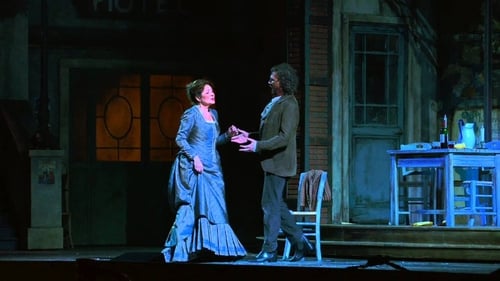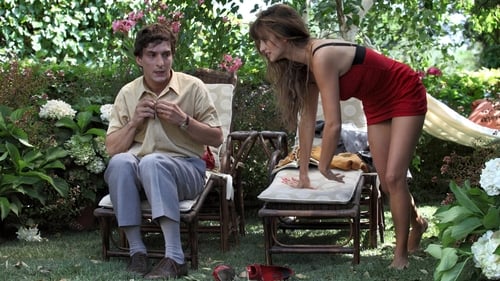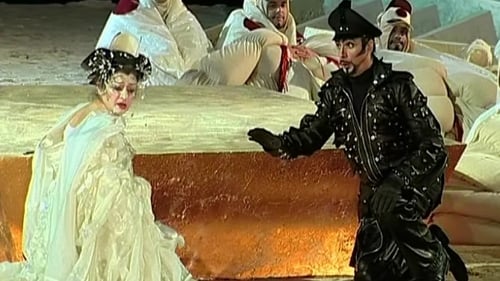
Rodolfo
Puccini's masterpiece La Bohème is by far the most represented opera in the world. At the famous Puccini Festival in Torre del Lago (2014), where Puccini composed his main operas, La Bohème is directed by one of Italy’s greatest film directors: Ettore Scola, the creator of a high number of award-winning seminal films. As he explains in the programme notes, as soon as he was approached to stage La Bohème he had to fight hard to resist the temptation to give life to his “revolutionary” ideas; in the end, he decided for a traditional looking, rich, grandiose and detailed Bohème. Together with the exceptional cast of Daniela Dessì, Fabio Armiliato, Alessandro Luongo, Marco Spotti and Alida Berti, this production makes for an incomparable great performance.

Count Loris Ipanov
Based on Rosetta Cucchi’s new staging of Umberto Giordano's Fedora at Teatro Carlo Felice, Ipanov bears witness to incessant survivor guilt, unable to escape restless remembrances of his ill-fated family and strongest regrets – betrayal, disgrace, loss and abandonment.

Giancarlo
O longa é dividido em quatro segmentos. Em um deles, um casal americano (Woody Allen e Judy Davis) viajam para Roma para conhecer a família do noivo de sua filha. Outra história envolve Leopoldo (Roberto Benigni), um homem comum que é confundido com uma estrela de cinema. Um terceiro episódio retrata um arquiteto da Califórnia (Alec Baldwin) que visita a Itália com um grupo de amigos. Por último, temos dois jovens recém-casados que se perdem pelas confusas ruas de Roma.

Mario Cavaradossi
This production from the historic Teatro Carlo Felice in Genova, Italy, stars the opera worlds power couple, Daniela Dessì and Fabio Armiliato, as lovers Tosca and Cavaradossi. A tragic tale of doomed love interlaced with the age-old themes of jealousy, lust and intrigue, has ensured Tosca its place in the top ten of opera favourites. Probably the best contemporary soprano-tenor combination (a couple in real life, too) Daniela Dessì and Fabio Armiliato are ranged against a worthy opponent in the form of Claudio Sgura as police chief Baron Scarpia.

Arrigo
Part of Tutto Verdi series 'I vespri siciliani' ('The Sicilian Vespers') is a five-act Italian opera originally written in French for the Paris Opéra and translated into Italian shortly after its premiere in June 1855. Under its original title, 'Les vêpres siciliennes', the libretto was prepared by Eugène Scribe and Charles Duveyrier from their work 'Le duc d'Albe', which was written in 1838 and offered to Halévy and Donizetti before Verdi agreed to set it to music in 1854. The story is loosely based on a historical event, the Sicilian Vespers of 1282, using material drawn from the medieval Sicilian tract 'Lu rebellamentu di Sichilia'.

Dick Johnson (Ramerrez)
The 51st Puccini Festival in Torre del Lago opened with a new production of an opera that is perhaps the composer‘s most underestimated work: “La Fanciulla del West” – often dismissed as a mere „western opera“. The musical director was Alberto Veronesi, artistic director of the festival. Ivan Stefanutti was the stage director, with spectacular sets by American painter Nall and an all-star cast including Daniela Dessì and Fabio Armiliato (the singers are regarded as two of the leading interpreters of Italian soprano and tenor roles) and the baritone Lucio Gallo.

Mario Cavaradossi

B. F. Pinkerton
Japan, early twentieth century. U.S. Navy Lieutenant B.F. Pinkerton inspects the house he has leased from a marriage broker. The broker, Goro, has procured him three servants and a geisha wife, Cio-Cio-San, known as Madama Butterfly. He is enchanted with the fragile Cio-Cio-San. Cio-Cio-San is heard in the distance joyously singing of her wedding. In a quiet moment, Cio-Cio-San shows her bridegroom her few earthly treasures and tells him of her intention to embrace his Christian faith. The Imperial Commissioner performs the wedding ceremony, and the guests toast the couple. The celebration is interrupted by Cio-Cio-San's uncle, a Buddhist priest, who bursts in, cursing the girl for having renounced her ancestors' religion. Alone with Cio-Cio-San in the moonlit garden, her husband dries her tears, and she joins him in singing of their love.

Radamès
tt2266516. Aida (2003) Gran Teatre del Liceu. Verdi / Italian. Filmed at the Gran Teatre del Liceu, Barcelona, Daniela Dessì, Elisabetta Fiorillo, Fabio Armiliato, Juan Pons and Roberto Scandiuzzi lead the cast in the renowned period production filmed in 2003 against the historic paper trompe-l'œil sets painted between 1936-45 by Josep Mestres Cabanes, the last representative of the old Catalan school of scenography. Mestres Cabanes worked on his Aida vision for eight years. The opulent staging he created in 1945 is here in every detail. The seven magnificent sets he painted for Aida in 1945 have been subtly and painstakingly restored by Jordi Castells and his team – revealing the palaces, temples and surroundings of Memphis and Thebes which the set designer had wanted to evoke in his historical yet also fantasy-like vision.







